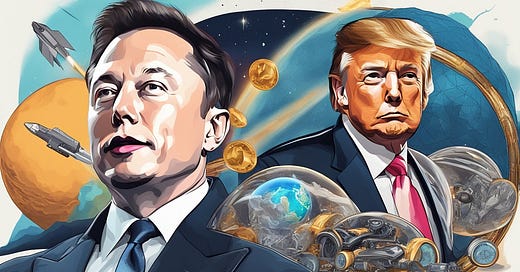America Votes, Markets Surge: Trump’s Win and the Immediate Economic Ripple Effects
Dear Investors,
Welcome to this week’s edition of the Myth of Money. If you would like to keep in closer touch, please reach out on X below.
A Resounding Mandate for Change
President-elect Donald Trump has clinched a sweeping victory to become the 47th President of the United States, with Americans giving him a powerful mandate across the popular vote, electoral college, and likely control of Congress. This decisive win clears the path for Trump's ambitious economic agenda aimed at reshaping the U.S. economy. His platform includes reducing the cost of living, securing borders, and rolling back foreign interventions, while focusing domestically on tax cuts for high earners and funding through broad tariffs, especially on Chinese imports.
With Republicans in control of the Senate, Trump appears well-positioned to push forward policies that promise to drive growth through corporate tax cuts and expanded energy production. Yet, the prospect of these moves raises concerns about potential inflation and wider economic impacts, as the nation awaits the real-life effects of this bold agenda.
Following Trump’s win, tech billionaire Elon Musk is poised to take on a pivotal role in the incoming administration. Musk, who has become one of Trump's most influential allies, is set to lead the newly proposed "Department of Government Efficiency" (D.O.G.E.), a nod to the cryptocurrency he once championed. The world's wealthiest individual has pledged to cut at least $2 trillion from the $6.5 trillion federal budget, citing concerns over America's financial trajectory. Trump, who devoted a substantial portion of his victory speech to praising Musk as a "super genius," has unofficially dubbed him the "Secretary of Cost-Cutting".
Another face familiar to the Trump campaign, Robert F. Kennedy Jr., is taking on a pivotal role aimed at reshaping U.S. health policies through the “Make America Healthy Again” (MAHA) initiative. His agenda centers on reforming federal regulations around food, pharmaceuticals, farm subsidies, and public health agencies like the CDC and FDA. Kennedy’s priorities include reducing the nation’s reliance on ultra-processed foods—which now make up more than half of Americans’ daily calories—tackling the rise in chronic diseases, and addressing declining life expectancy.
Despite controversy over his vaccine views, Trump has promised Kennedy substantial influence over health institutions. Among Kennedy’s proposals are removing fluoride from drinking water, citing concerns about its impact on IQ, and limiting fees that drug companies pay the FDA, which he argues compromise the agency’s independence. With potential allies like Stanford-trained physician Casey Means considered for FDA leadership, the MAHA initiative suggests a significant shift. These health reforms could bring major regulatory changes across the healthcare, food, and pharmaceutical sectors.
Markets React to Trump’s Triumph
The markets celebrated Trump’s victory with an immediate rally, as all three major indexes surged: the Dow Jones rose 3.6% in its best one-day jump since 2022, while the S&P 500 and Nasdaq climbed 2.5% and nearly 3%, respectively. Volatility, measured by the VIX, dropped sharply—over 20% by early Wednesday—indicating investor confidence in the win. The U.S. dollar similarly experienced a substantial surge, marking its biggest spike since 2020, and bond yields rose as well, with the 10-year Treasury yield jumping more than 15 basis points, reaching its highest level since July. Banks and industries anticipated to benefit from Trump’s policies, such as those poised for tax cuts and regulatory rollbacks, were among the biggest winners.
While investors remained largely optimistic, some cautioned that the so-called 'Trump bump' could prove fleeting. Economists have pointed out that if Trump’s comprehensive policy agenda—including stringent deportation measures and sweeping tariffs—were fully implemented in an effort to fulfill his promises of stronger border security and a more resilient domestic economy, it could lead to rising inflation and widening structural deficits.
Crypto’s Record-Breaking Moment(s)
As Trump’s victory became imminent, Bitcoin soared past $75,000 and surged to even greater heights of +$80k over the weekend, extending its seven-day gain to more than 16%, with crypto equities following suit. The weekend surge, occurring when institutional investors are typically less active, suggests strong participation from retail investors. The rally marks an 88% gain for Bitcoin since the start of 2024.
This election—the most expensive to date—saw substantial investment from the crypto sector, as Trump positioned himself as the "crypto candidate." His agenda includes establishing a favorable regulatory framework for cryptocurrency and supporting energy infrastructure essential for crypto mining. He’s also proposed a strategic Bitcoin reserve for the U.S., a move that could anchor Bitcoin's legitimacy within mainstream finance and, as Anthony Pompliano put it, “kick off a level of global FOMO unlike anything we have seen before.”
Trump’s “Day 1” crypto-related promises: freeing Ross Ulbricht, the founder of Silk Road, and dismissing SEC Chair Gary Gensler. These actions would be part of his larger mission to create a pro-crypto environment, a vision echoed by Digital Chamber President Cody Carbone, who said, “We now have the most crypto-friendly Congress and administration coming into Washington that we’ve ever had.”
The Fed Stands Firm Amid Political Shifts
In a move unaffected by the election, the Federal Reserve has cut interest rates by 25 basis points, bringing the federal funds rate to a target range of 4.50% to 4.75%. Fed Chair Jerome Powell remains committed to the Fed's independence—a principle granted by Congress in 1951 to enable the central bank to make long-term economic decisions without the influence of short election cycles. Powell’s term, set to expire in May 2026, would then allow Trump (with Senate confirmation) to appoint a new chair to steer the Federal Reserve for the next term. Powell has signaled he won’t step down even if Trump were to request it, underscoring the Fed’s intent to avoid political pressures.
This stance reflects lessons from history: the last time a president meddled with Fed policy, it was Richard Nixon—whose insistence on keeping rates low is widely considered to have contributed to the Great Inflation of the 1970s. Today, as Trump’s economic policies unfold, the Fed’s independence could play a key role in moderating any inflationary pressures, keeping monetary policy on a steady course amidst potential shifts in fiscal policy.
This Week By the Numbers 📈
🗳️ Election Aftermath:
• Polymarket vindicated, with $3.6B volume
• 220 pro-crypto candidates elected (so far)
• Trump talks up tariffs in post-election speech
• Trump's criminal election case paused
• Harris campaign ends with $20M in debt
💼 Business & Finance:
• Tesla hits $1T market cap
• BlackRock Bitcoin ETF surpasses Gold ETF
• Elon Musk's net worth jumps over $20B post-election
🌐 International Affairs:
• Canada orders TikTok to close Canadian offices
• Germany's government coalition collapses
• France scrutinizes Polymarket's compliance with gambling laws
• Musk joins Trump's call with Zelensky
🏛️ Regulation & Legal:
• BoE cuts rates to 4.75
• Bankers anticipate end of Lina Khan era, M&A revival
• FTX Executive Nishad Singh avoids prison time
🚀 Crypto & Technology:
• Detroit allows residents to pay taxes with crypto through PayPal
• WonderFi CEO kidnapped, released after paying $1M ransom
• Coinbase brings Bitcoin to Solana
• D.O.G.E. surges >110%
🌡️ Climate:
• 2024 on track to be hottest year on record
Top Stories 🗞️
BlackRock’s Bitcoin ETF posts record $1.1 billion in single-day net inflows
BlackRock’s iShares Bitcoin Trust (IBIT) attracted a record net inflows [on Thursday], worth $1.12 billion. The unprecedented inflows into IBIT come a day after the spot bitcoin exchange-traded fund set a new record of single-day trade volume of over $4 billion.
“[Trump’s victory], combined with the Fed rate cut on Thursday, spurred institutions to make the plunge into crypto markets,” said Jeff Mei, COO at BTSE crypto exchange. “With more rate cuts coming, the prospect of pro-crypto regulations, and a continued China stimulus, it makes sense that institutions are flocking to Blackrock's Bitcoin ETF, and we expect even more in the coming months.”
With $1.12 billion flowing into IBIT, the 12 U.S. spot bitcoin ETFs had a total daily net inflow of $1.38 billion, which marks the highest total daily net inflows from spot bitcoin ETFs. The funds collectively had $2.76 billion in trade volume on Thursday.
Trump's Republicans hold narrow edge in fight for US House majority
WASHINGTON, Nov 8 (Reuters) - Donald Trump's Republicans held on to a narrow edge on Friday as election officials tallied the final votes that will determine control of the U.S. House of Representatives, though Democrats succeeded in flipping a pair of New York state seats.
Republicans have secured at least 211 seats, seven short of the majority in the 435-member chamber, with 24 races left to be called, according to projections by Edison Research. Republicans are set to hold a majority of least 53 seats in the Senate.
Full congressional control by Republicans would give Trump great leeway to pursue policies including sweeping tax cuts, energy deregulation and border security controls. Should Democrats succeed in capturing a majority, which would require them to win 18 of the 24 as-yet uncalled seats, it would give them a bulwark to push back against him.
Trump Is Shaping US Foreign Policy Well Before He Takes Office
President-elect Donald Trump doesn’t take office for more than two months but he’s already shaping US policy in two major hot spots: Israel and Ukraine.
With phone calls to the leaders of both nations, and another expected with Russian President Vladimir Putin, Trump’s victory — and the possibility he will seek major policy changes — is reverberating in both countries and well beyond.
One former Trump administration official, who asked not to be identified discussing private assessments, said the president-elect will have an immediate head start thanks to the perception that he will be tougher than his predecessor. US adversaries may change their behavior in advance, the person said — some deterred by the threat of US retaliation, and others seeking to exploit their remaining leverage before President Joe Biden leaves office.
That’s being felt most acutely in Ukraine. Trump promised during the campaign to solve the Ukraine crisis before Inauguration Day, and President Volodymyr Zelenskiy is already scrambling to catch up.
The country whose leader benefits the most from Trump’s arrival is Israel. Prime Minister Benjamin Netanyahu is a longtime ally of Trump’s and had a tense relationship with Biden as the US pressed for an end to the Israeli campaign in Gaza.
Trump has already signaled he would leave Israel a freer hand to strike against Iran’s nuclear program, especially if Tehran indicates it may shift its policy and seek a nuclear weapon.
China unveils $1.4 trillion local debt package but no direct stimulus
China unveiled a 10 trillion yuan ($1.40 trillion) debt package on Friday to ease local government financing strains and stabilise flagging economic growth, as it faces fresh pressure from the re-election of Donald Trump as U.S. president.
The measures confirm last week's Reuters report, and mark a departure from the all-out stimulus strategies to revive growth China has deployed in the past. They aim to repair municipal balance sheets as a longer-term objective, rather than directly inject money into the economy.
Finance Minister Lan Foan said more stimulus was coming, with some analysts saying Beijing may not want to fire all its weapons before Trump takes over officially in January.
In an apparent reaction to the U.S. election and the intensifying risks to trade, state media CCTV reported that China's cabinet on Friday approved expanding coverage of export credit insurance and will step up support for trade firms.
But for now, those investors who speculated on a fiscal bazooka may be disappointed.
Stablecoin Giant Tether Enters Oil Trade by Financing $45M Middle Eastern Crude Deal
Tether said its investment division financed a $45 million crude oil transaction between a major oil company and commodity trader, part of the USDT issuer's attempt to expand beyond its influential stablecoin roots.
The issuer of USDT, the third-largest cryptocurrency, is seeking to carve out a niche within the $10 trillion trade finance industry — which plays a crucial role in facilitating international trade and commerce by reducing risks associated with cross-border transactions. Tether revealed its plan to enter commodities trade finance last month, and it's also expanding into venture capital, bitcoin (BTC) mining and artificial intelligence.
The October transaction involved 670,000 barrels of Middle East crude oil cargo and took place between "a publicly traded super-major oil company" and "top-tier commodity trader," Tether said.
“Myth Of Money” Book - Shipping this week! 🤓
As many of you know, making financial education accessible has always been a passion of mine. After a year of hard work, I'm excited to announce that my new book, published by Wiley Publishing, is finally out!
This book is a thrilling blend of personal stories from the financial world, coupled with clear explanations of how things really work—from investment banking and stocks to venture capital, macroeconomics, and cryptocurrencies.
Thank you for reading this week’s edition of the Myth of Money.🚀
Were you forwarded this email? Subscribe below.
Until next week,
Tatiana Koffman
About the Author: Tatiana Koffman
Hi there and thanks for reading! If you stumble upon my newsletter, you will notice that I write about money, economics, and technology. I hold a JD/MBA and spent my career in Capital Markets working across Mergers & Acquisitions, Derivatives, Venture Capital, and Cryptocurrencies. I write to make financial topics more accessible and create equal opportunity for the next generation of investors. Currently working as a proud General Partner at Moonwalker Capital.
(More about me 👉 here).
About the Author: Katherine MacLellan
Katherine holds an MA (Hons) in Economics and International Relations from the University of St. Andrews, and a JD from Osgoode Hall. She has been thinking and writing about Bitcoin and blockchain technology since 2012.






